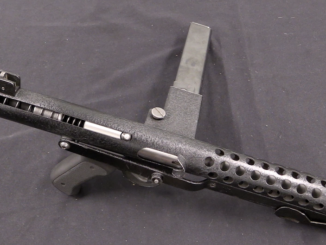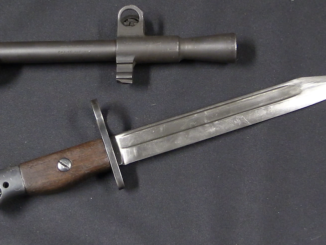It may look like an airport bookshop thriller, but don’t let the cover fool you – Dr. Matthew Ford’s “Weapon of Choice” is a seriously rigorous academic study of the military small arms adoption process. The process is examined through the lens of the series of new rifles adopted by the UK through the 20th century – the SMLE, No4 Enfield, SLR, SA80, and FN Minimi.
Where most book on a subject like this focus on the weapons themselves, Ford instead examines the political and sociological factors that drove the decision making process. In doing so, he is promoting a particular sociological theory about group interaction – I think. Some of the language requires too many letter after one’s name for me to understand, but that does not obstruct the fantastic history at the heart of the book.
- Was the SMLE a tool for the cavalry to remain relevant in a military environment becoming more suitable for ousted infantry?
- Could the .280 British cartridge have been adopted by NATO if the British had challenged the US standard for terminal effectiveness instead of attempting to meet it?
- Do soldiers actually have the perspective necessary to make effective weaponry choices or are they vulnerable to appearance and advertising like any normal commercial product?
- How did the major NATO members differ in their vision of infantry combat and how did that lead to different small arms preferences among them?
- What made FN so sneaky and effective?
Okay, Ford doesn’t really ask that last one, but one will probably close Weapon of Choice with a new respect for FN’s marketing prowess. The rest of these are major topics of the book, and Ford presents his theses with a substantial level of detail and insight that I have not found elsewhere. If any of these question pique your interest, then you should definitely pick up a copy of Weapon of Choice.




Don’t you have an Amazon Partners link for this book, so that purchases made on your recommendation net you a little cash for your efforts? Would love to see you prosper more from your fine work.
Mr McCollum, anyone who correctly uses the pronoun “one” is educated enough in my book . . .
Have you ever considered publishing the list of all the books you have ?
Throwing away the dust jacket ? For book collectors this is heresy. When the book gets out of print and sought by collectors, the condition of the dust jacket is often the prime determination of the value of the book. Hard-core book collectors indeed judge the monetary value of a book by an intact dust cover in pristine condition.
Dust covers are a relatively recent addition to (hardcover) books, so the most desirable truly old books didn’t even have one originally. But you are of course right that throwing them away or damaging them will reduce collectable value, just like opening the original box will reduce the value of many collectible items…
I threw away the dust jacket from a first printing Hunt for Red October. Taught me.
I work in a university library, we throw away the covers for standard stock items. We only keep the covers for books which are part of the special collections stock.
And finally, thank you for the warning of ivory-tower constructions – undecipherable text.
No, I did not understand the paragraph you quoted either. It is not a question of lack of education – I have an engineering degree which involved no small amount of non trivial maths and I could not make any sense of the gibberish either. The problem is not a unhappy feeling about a lack of education but rather a severe problem of academia in general which tends to favor overly complicated sentences instead of actually teaching clearly.
After buying the Bush War book on South African firearms development you recommended I will also get that book.
I think what it meant was something along the lines of “If we’re seriously talking about buying a poodle-shooting M-4 with a 10″ barrel, isn’t that just the same as a submachinegun? Haven’t the terms ‘carbine’, ‘assault rifle’, and ‘submachine gun’ become worthless?”
Well, I studies history (Master’s degree), and the part made sense to me. More importantly, I don’t know a better way to say it. Basically, what he says in there is that he wants to put academia away and aim for easy understanding rather then academic penetration.
With terms such as “socio-technical phenomena” I thought the crux of the issue had been laid bare, then Wikipedia revealed this:
https://en.wikipedia.org/wiki/Sociotechnical_system
Hmmm….